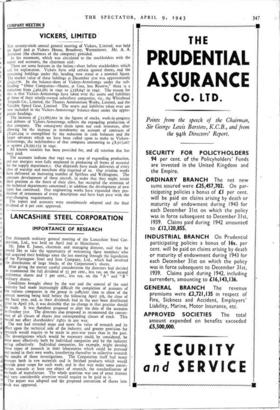LANCASHIRE STEEL CORPORATION
IMPORTANCE OF RESEARCH
Tits thirteenth ordinary general meeting of the Lancashire Steel Corporation, Ltd., was held on April znd at Manchester. Mr. John E. James, chairman and managing director, said that he would like to take the opportunity of welcoming tbpse members' who had acquired their holdings since the last meeting through the liquidation of the Partington Steel and Iron Company, Ltd., which had involved the distribution of large blocks of the Corporation's shares. After giving the matter careful consideration the directors had decided to recommend the full dividend of 51 per cent., less tax, on the second preference shares and 7 per cent., less tax, on the "A" and " B " ordinary shares.
Conditions brought about by the war and the control of the steel industry had made increasingly difficult the completion of accounts of the various companies in the .group in sufficient time to allow of the annual meeting being held before the following April 5th, the close of the fiscal year, and, as their dividends had in the past been distributed prior to April 5th, it was desirable that no change in that practice should he made. It was therefore proposed to alter the date of the accounts to October 3Ist. The directors also proposed to recommend the conver,ion of all classes of shares into corresponding classes of stock. This would not affect shareholders' rights in any way.
The war had revealed more and more the value of research and its effect upon the technical _side of the industry, and greater provision for research would require to be made in post-war years than in the past. The investigations which would be necessary could, he considered, be clone most effectively both by individual companies and by the industry acting collectively. Individual companies, for example, might develop those types of research in their laboratories which could be pursued rid tested in their own works, transferring thereafter to collective research he results of those investigations. The Corporation itself had many venues both in raw materials and in finished products which would rovide great scope for such work, and in that way make some contriu:ion towards at least one object of research, the standardisation of erhods of manufacture. The whole question was one of great interest rid very considerable attention would require to be paid to it. The seport was adopted and the proposed conversion of shares into rock was approved.






















 Previous page
Previous page